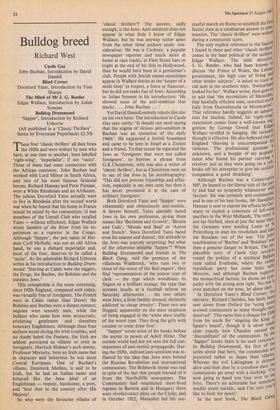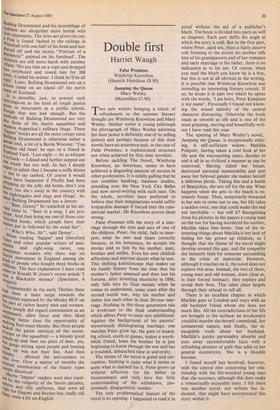Bulldog breed
Richard West
Castle Gay John Buchan, Introduction by David Daniell Blind Corner Dornford Yates, Introduction by Tom Sharpe The Mind of Mr J. G. Reeder Edgar Wallace, Introduction by Julian Symons Bulldog Drummond 'Sapper', Introduction by Richard Usborne (All published in a 'Classic Thrillers' Series by Everyman Paperbacks £2.50) These four 'classic thrillers' all date from the 1920s and were written by men who have, at one time or another, been labelled 'right-wing', 'imperialist', if not 'racist'. Three of them had some connection with the African continent. John Buchan had worked with Lord Milner in South Africa, and two of his most famous fictional heroes, Richard Hannay and Peter Pienaar, were a White Rhodesian and an Afrikaner. The odious Dornford Yates actually went to live in Rhodesia after the second world war when he feared that his home in France would be seized by the communists. (I met members of the Umtali Club who recalled Yates — without affection). Edgar Wallace wrote Sanders of the River from his ex- periences as a reporter in the Congo. Although 'Sapper', the pen name of Her- man Cyril McNcile, was not an old Africa hand, he was a diehard imperialist and, most of the four, deserves to be called a 'racist'. As the admirable Richard Usborne writes in his introduction to Bulldog Drum- mond: 'Starting at Calais were the niggers, the Frogs, the Boches, the Bolshies and the stateless Jews.'
This xenophobia is the more surprising, since 1920s England, compared with today, was virtually free of foreigners. The French were in Calais rather than Dover; the Bolshies and Boches were a distant menace; negroes were scarcely seen, while the Indians who came here were aristocratic,
cricketing gentlemen and therefore honorary Englishmen. Although these four authors wrote during the Irish troubles, and no doubt hated the Fenians, the Irish are seldom portrayed as villains or even as foreigners. Sherlock Holmes's arch enemy, Professor Moriarty, bore an Irish name but in character and behaviour he was more Central European. One of Buchan's villains, Dominick Medina, is said to be Irish, but he had an Italian name and behaved like the beau ideal of an Englishman — tweedy, handsome, a poet, and 'best shot in the country after His Majesty'.
So who were the favourite villains of 'classic thrillers'? The answer, sadly enough, is the Jews. Anti-semitism does not appear in what little I know of Edgar Wallace, but he was anyway rather apart from the other three authors under con- sideration. He was a Cockney, a popular newspaper reporter and much more at home at race tracks, in Fleet Street bars or (right at the end of his life) in Hollywood, than he would have been in a gentleman's club. People with Jewish names sometimes appear in Wallace stories as the 'keeper of a snide shop' (a forger), a fence or financier, but he did not make fun of Jews. According to Julian Symons in his introduction: 'He showed none of the anti-semitism that marks . . . John Buchan . .
Yet David Daniell entirely rejects this slur on his own hero. The introduction to Castle Gay says curtly: 'It should not need saying that the stigma of vicious anti-semitism in Buchan was an invention of the early 1960s'. He supported a Jewish homeland and came to be seen in Israel as a Zionist and a friend. To that extent he regarded the Jews as 'foreigners that were not called foreigners', to borrow a phrase from G.K.Chesterton, who was also a writer of 'classic thrillers', but as Chesterton went on to say of the Jews in his autobiography: `This did not prevent friendship and affec- tion, especially in my own case; but then it has never prevented it in the case of ordinary foreigners'.
Both Dornford Yates and 'Sapper' were vehemently and obnoxiously anti-semitic. A lawyer himself, Yates specially hated Jews in his own profession, giving them names like 'Bertheim and Growth', 'Biretta and Cain', 'Mosaic and Baal' or 'Aaron and Stench'. Since Dornford Yates hated even his nearest and dearest, this attitude to the Jews was scarcely surprising; but what of the otherwise amiable 'Sapper'? When Bulldog Drummond and friends in The Black Gang, raid the premises of the villainous Waldstock, 'who runs two or three of the worst of the Red papers', they find 'representatives of the poorer type of clerk — the type which woodbines its fingers to a brilliant orange; the type that screams insults at a football referee on Saturday afternoons . . the two others were Jews, a little flashily dressed, distinctly addicted to cheap jewelry'. These two are flogged, apparently on the mere suspicion of being engaged in the 'white slave traffic of the worst type. They drug the girls with cocaine or some dope first'.
'Sapper' wrote most of his books before the ascent to power of Adolf Hitler. The outside world had not yet seen the full con- sequences of anti-semitic propaganda. Dur- ing the 1920s, militant anti-semitism was in- flamed by the idea that Jews were behind the Russian Revolution and international communism. The Bolshevik threat was real in spite of the fact that people learned of it from the Northcliffe newspapers. The Communists had established short-lived regimes in Bavaria and in Hungary; there were revolutionary plots on the Clyde; and in October 1922, Mussolini led his suc- cessful march on Rome to establish the first fascist state as a totalitarian answer to corn' munism. The 'classic thrillers' were written during a communist scare.
The only explicit reference to the fascist! I found in these and other 'classic thrillers comes in the least political of the authors' Edgar Wallace. The mild detective. J. G. Reeder, who had been known t° discuss 'the Prince of Wales, the Labour, government, the high cost of living and other tender subjects', is asked to trace all, old lady in the southern Alps. `Switzerland looked for her', Wallace wrote, then goeso.fi to add that 'the myrmidons of Mussolini, that hatefully efficient man, searched north Italy from Domodossola to Montecatinl That reference hardly suggests an admira; tion for fascism. Indeed, his 'right-Wing reputation comes from a well-known sa' gestion by George Orwell that Edgar Wallace revelled in hanging. He certainly thought it effective. He also believed that In England 'thieving is unaccompanied by violence. The professional gunman .1s unknown, and a burglar of my acqualll' tance who found his partner carrying ° revolver just as they were going on a .lob' broke off his enterprise to give his reckless companion a good thrashing'. Although Buchan was a Conservative MP, he leaned to the liberal side of the l)°1,, ty and had no sympathy whatsoever vvlt" fascism. He was certainly anti-communist; and in one of his best books, Mr Standfas" Hannay is sent to expose the efforts by 0er: many to exploit a commune of left-willg pacifists in the West Midlands. The story 15 not far-fetched, since at just the same time: the Germans were sending Lenin to Sl Petersburg to start his revolution and take the Russians out of the war. The joint Via ..: machination of 'Boches' and 'Bolshies' ' then a genuine danger to Britain. The 1111' plausible story of Castle Gay revolves round the politics of a mythical Balkan state called Evallonia, where the . ruling republican party has some links ot11 Moscow, and although Buchan suIVrt', the monarchical faction, he shows no pathy with the strong-arm right. No-one Is even punched on the nose, let alone shot' In Dornford Yates's Blind Corner, the narrator, Richard Chandos, has lately been sent down from Oxford for 'using some avowed communists as many thought they) deserved'. This earns him a cheque for £3 1.1 from his uncle for 'singeing the King 13 Spain's beard', though it is never rrlar, clear exactly how Chandos caused the 'discomfiture' of the communists. In the 'Sapper' books there is no such reticence' In Bulldog Drummond, the first of the series about that hero, the communists are presented rather as dupes than villatna Whereas the evil Lakingham is skinlIc alive and then shot by a crossbow dart, tlle communists get away with a ducking: now going to hand you four over to the boys. There's an admirable but sorneh°,vid muddy pond outside, and I'm sure you like to look for newts'. In the next book, The Black Gang' Bulldog Drummond and his assemblage of clubmen are altogether more brutal with their opponents. The Jews are given the cat; a Pole is found 'lashed to the railings in Whitehall with one half of his head and hair shaved off and the motto "Portrait of a Bolshevist" painted on his forehead'. The clubmen are still more harsh with another
'We put him on a rope and dropped 'um overboard and towed him for 300 Yards, Cooled his ardour. I think he'll be all right'. Later, Bulldog Drummond sets up a Prison camp on an island off the north coast of Scotland.
It is possible, just, to present such car rYings-on as the kind of rough justice given to miscreants at a public school, "N O that was bad enough. But the ethods of Bulldog Drummond are very like those of the fascist squadristi and modern Argentina's military thugs. These 13`)aPPer' books are all the more creepy since :1,1(108 Drummond is otherwise rather a "11tal soul, a bit of a Bertie Wooster: 'You reeless old bean' he says to a friend in i,e°tland Yard. 'Last night — let us whisper .` m Gath — I dined and further supped out "r3t wisely but too well. In fact I deeply regret to admit that I became a trifle blotto hot to say tanked. Of course it would h"ever have happened if Phyllis had been
know: up the jolly old home, don't you the but she's away in the country with
d e nightingales and slugs and things'. [n- eed Bulldog Drummond has a Jeeves: y "Beer, Denny" he remarked as his ser- stent came in. "Beer in ea mug. I am pro- f rate. And then bring me one of those con- founded books which people have their names put in followed by the usual lies".
Who's Who, Sir", said Denny'.
y te ws hen reading 'Sapper' and Dornford s: and other popular writers of anti- s-nlitic and right-wing views, one tNetimes wonders why there was no aiseist movement in England among the k mof people who bought these books in "°os. The best explanation I have read was in Ronald W.Jones's recent article 'I 8 a Blackshirt menace' (Spectator, 6 August): h:Pncloubtedly in the earl surge towas the patriotism the Part of by the Mosley BUF on .,,, Part of rather hearty men and women. use People did regard communism as an n Pleasant, alien force and they liked 111°,t,hing better than the opportunity of la 'Zing Red noses bloody. But these people tr'eci the gutter instincts of the storm- p u°,013Le r or the squadristi — a bloody good bje"uP and then ten pints of beer, yes, them gangs setting upon people and beating ups was not their line. And then tac,v' !`eY • • . allowed the anti-semites to massed over. Over a matter of months the membership of the hearty types ItIPIY dissolved'. lerriViaYbe 'Sapper' readers were also repel- sal by the vulgarity of the fascist parades, rights and silly uniforms, that were all bean' f Dagoes and Roches but, really old An, were a bit un-English.



































 Previous page
Previous page